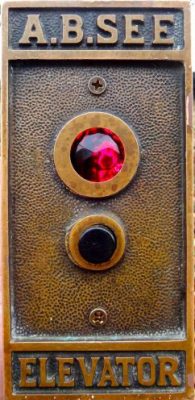
Alonzo Bertram See (1848-1941) was a prominent elevator manufacturer from New York City. Born in Yonkers, See started his own company in 1883 and began to ride the skyscraper boom to success and wealth. By the turn of the century, See was a millionaire several times over and his business – the quirkily named A. B. See Elevator Company – was the third largest manufacturer and installer of elevators in the United States.
New Yorkers rode in See’s elevators, and thus were familiar with his name, but knew little of him until the 1920s. In 1922, Adelphi College, a Brooklyn women’s college, started a fundraising drive and wrote to See seeking donations. He responded in the negative, explaining his views bluntly:
“Of all the fool things in the world, I think colleges for women are the worst… College girls are slangy, they swagger, smoke cigarettes, have bold and brazen manners, paint and powder their faces, use lipsticks, wear high heeled shoes and dress indecently… When they graduate from college they cannot write a legible hand; they know nothing about the English language; they cannot spell… All women’s colleges ought to be burned.”
“I never discuss anything logical with women. They can talk straight for about five minutes and then they go off the handle. They haven’t got the reasoning power a man has, and I wouldn’t think of debating with any woman on any subject.”
Apparently enjoying the notoriety, Alonzo See became something of a social critic. His two favourite targets were women and education, both of which he seemed to regard as a waste of time.
When reformers sought legislation to outlaw child labour in 1924, See wrote agitated letters to the press, claiming that it was physically harmful to keep 13-year-old boys in school. Two years later, he penned a lengthy essay on education, arguing that school causes some children to go blind and others to physically “waste away”. “Children must be rescued from their mothers and from pedagogues,” See wrote, and “women must be rescued from themselves”.
The New York press published smirking references to See’s sexism for many years. In 1936, however, it was revealed that A. B. See had undergone an epiphany with regard to women and had “changed his mind on them altogether”.
Source: Various inc. New York Tribune, November 24th 1922. Content on this page is © Alpha History 2019-23. Content may not be republished without our express permission. For more information please refer to our Terms of Use or contact Alpha History.
